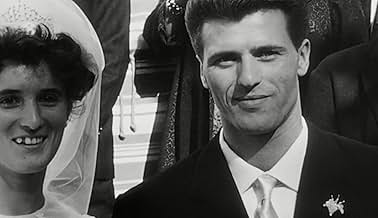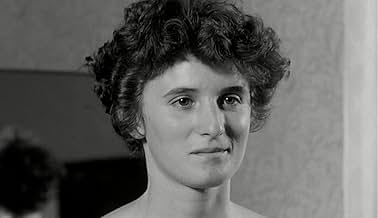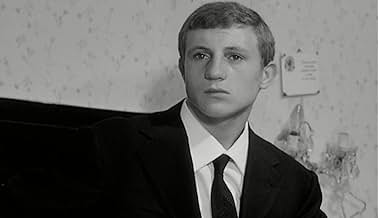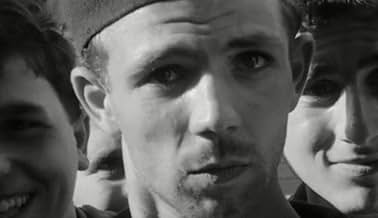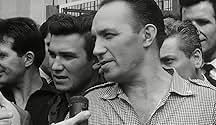VALUTAZIONE IMDb
7,5/10
2826
LA TUA VALUTAZIONE
Microfono alla mano, Pier Paolo Pasolini chiede agli italiani di parlare di sesso. Nonostante la fiorente economia del dopoguerra, gli atteggiamenti degli italiani verso il sesso sono o rigi... Leggi tuttoMicrofono alla mano, Pier Paolo Pasolini chiede agli italiani di parlare di sesso. Nonostante la fiorente economia del dopoguerra, gli atteggiamenti degli italiani verso il sesso sono o rigidamente medievali o confusi e autocensuranti.Microfono alla mano, Pier Paolo Pasolini chiede agli italiani di parlare di sesso. Nonostante la fiorente economia del dopoguerra, gli atteggiamenti degli italiani verso il sesso sono o rigidamente medievali o confusi e autocensuranti.
Lello Bersani
- Narrator
- (voce)
Io Appolloni
- Self - Girl at Lido with Swimming Cap
- (non citato nei titoli originali)
Graziella Chiarcossi
- Graziella the Bride
- (non citato nei titoli originali)
Graziella Granata
- Self - Girl at Lido with Long Hair
- (non citato nei titoli originali)
Pier Paolo Pasolini
- Self - Interviewer
- (non citato nei titoli originali)
Recensioni in evidenza
In this documentary, Pasolini travels around Italy and interviews random people in public places about their attitudes towards sexuality, marriage, and gender issues. It's fascinating to hear how Italians in the early 1960s felt about these topics, and there are plenty of opinions that seem shocking from a modern perspective. There are people who think that divorce should be illegal (they'd rather have spouses kill each other), parents who find it perfectly normal for 14 year-old boys to lose their virginity with a prostitute, and women who think it's only right that they have less rights and freedoms than men. It's especially interesting to hear the interviewees confess their unabashed disgust towards homosexuals to the secretly gay director.
However, I can't help but wonder if it wouldn't have been more interesting to include some interviews that weren't conducted in public places with groups of people standing around. As it stands, the movie gets a bit repetitive after a while and probably would have been more effective with a shorter running time.
However, I can't help but wonder if it wouldn't have been more interesting to include some interviews that weren't conducted in public places with groups of people standing around. As it stands, the movie gets a bit repetitive after a while and probably would have been more effective with a shorter running time.
Pier Paolo Pasolini always has a streak of the documentary filmmaker somewhere in his body of work, where he usually went for expressing his poetic viewpoint on the lower classes (i.e. Mamma Roma) and, later on, the dark fables and tawdry tales of Oedipus Rex and Arabian Nights. If Love Meetings, his only straight documentary feature, isn't completely impressive it may be because in the little moments when he tries for something poetic, oddly enough, like in the numbered transitions, it doesn't really work as well. Those little bits come off as dated 60s stuff. On the contrary though when Pasolini simply takes to the street with a 16mm and a microphone and asks people directly about sex and women's roles and homosexuality and fidelity and freedoms related to all of the above then it gets really interesting. In fact, for a movie relegated to Italian cities and countrysides, with sound-bytes from across the spectrum from college kids to professors (and author Alberto Moravia early on) to farmers in the fields, and done so on the fly and in classic cinema verite style, it doesn't usually feel very old fashioned.
Much of what's discussed and dug up by Pasolini (who reveals himself wonderfully here as a solid journalist, something I would have liked to have seen more of in his career after seeing this) can be relatable for today's youth, if only as a cohesive set of opinions and viewpoints and occasional factoids on standards set between men and women and privacy and liberation and so on. To be sure some of it is stuck in its time and place (practically all of the children asked "Where do babies come from?" say the stork, or something involving God or other). But a lot of it is so absorbing because of the generous flow of ideas- it's a wonderfully edited piece, as sometimes crudely constructed as it is, which is part of the point as a true independent production- and Pasolini's determination to get as much as he can at the heart or whatever at sexual relations and societal norms and what's changed over time in Italy and if there can be any more change in the future. It's probably the most obvious example from the director to screen in a sociology class. 8.5/10
Much of what's discussed and dug up by Pasolini (who reveals himself wonderfully here as a solid journalist, something I would have liked to have seen more of in his career after seeing this) can be relatable for today's youth, if only as a cohesive set of opinions and viewpoints and occasional factoids on standards set between men and women and privacy and liberation and so on. To be sure some of it is stuck in its time and place (practically all of the children asked "Where do babies come from?" say the stork, or something involving God or other). But a lot of it is so absorbing because of the generous flow of ideas- it's a wonderfully edited piece, as sometimes crudely constructed as it is, which is part of the point as a true independent production- and Pasolini's determination to get as much as he can at the heart or whatever at sexual relations and societal norms and what's changed over time in Italy and if there can be any more change in the future. It's probably the most obvious example from the director to screen in a sociology class. 8.5/10
Saw this beautifully preserved/restored print, with subtitles, via YouTube. Pasolini, with his reputation for political and every other form of radicalism, seems inhibited here, even in the discussion segments with Alberto Moravia and Cesare Musatti. The man-and-woman (and children, students)-in-the-street-and-on-the-farm interviews seem dated, probably since the interviews were conducted on the cusp of major changes in marital and family laws, policies, sexual attitudes in Italy and elsewhere. While no groundbreaking documentary, it's still a fascinating document of the time and place. A more daring and cinematically imaginative treatment of similar themes is found in, of course, "I am Curious (Yellow)"(1967) and "I am Curious(Blue)"(1968), directed by Vilgot Sjoman (a former UCLA film student). In those days there were things you could do in Sweden, albeit with censorship problems, that were simply impossible in Italy, period.
Comizi d'amore (1965)
*** (out of 4)
Pasolini travels around Italy throwing a mic into various ranges of people asking frank and honest questions about sexuality. Various topics ranging from homosexuality, prostitutes, divorce, sexual freedom and even asking kids where babies come from. The type of people range from college students to the rich and poor and to women who normally can't speak openly. I'm sure this film was more of a sensation when originally released but I think it holds up quite well today for several reasons. For one, it's interesting to look back over forty-years ago and see how young people at the times thought about sex but also how the older people back then looked back on the moral and religious rules of their youth. The film also holds up well today because things really haven't changed too much whenever you really break down the groups of people like Pasolini did. I'm not sure is there was a point to this documentary as it seems like the director simply wanted to know what the country felt on certain issues. There's a lot of humor to be found in the film but most of this comes from the answers the children give about where babies come from. The most interesting thing, knowing that the director was gay, is him asking people about homosexuality and the answers they give him. Most people reply with disgust and I kept wondering if the director would crack and say something but he never does. I think the film goes on a bit too long but it's an interesting look at sexuality on moral and religious aspects.
*** (out of 4)
Pasolini travels around Italy throwing a mic into various ranges of people asking frank and honest questions about sexuality. Various topics ranging from homosexuality, prostitutes, divorce, sexual freedom and even asking kids where babies come from. The type of people range from college students to the rich and poor and to women who normally can't speak openly. I'm sure this film was more of a sensation when originally released but I think it holds up quite well today for several reasons. For one, it's interesting to look back over forty-years ago and see how young people at the times thought about sex but also how the older people back then looked back on the moral and religious rules of their youth. The film also holds up well today because things really haven't changed too much whenever you really break down the groups of people like Pasolini did. I'm not sure is there was a point to this documentary as it seems like the director simply wanted to know what the country felt on certain issues. There's a lot of humor to be found in the film but most of this comes from the answers the children give about where babies come from. The most interesting thing, knowing that the director was gay, is him asking people about homosexuality and the answers they give him. Most people reply with disgust and I kept wondering if the director would crack and say something but he never does. I think the film goes on a bit too long but it's an interesting look at sexuality on moral and religious aspects.
I too was disappointed, but not for the reasons cited in the previous comment.
Instead, I found the film very hard to follow, with lots of academic buzzwords (interviewer Pasolini refers to "the sex problem" at least 20 times), not all of it subtitled, and subtitles that faded out of legibility against light backgrounds.
The movie was visually unappetizing, in part because of inconsistent and often inept camera work, and in part because of a sloppy transfer to tape that washed out the middle tones and often made it hard to see and read people's faces.
The most annoying element was the recurrent muting of the voice tracks (and of course the accompanying sub-titles) that was labeled "self-censorship." Was this a comment on official censorship of the time? I get the impression that the most interesting answers were lost to the audience through this process.
An interesting and meaty idea from a provocative and often great filmmaker, undercut by directorial inexperience and poor repackaging.
Instead, I found the film very hard to follow, with lots of academic buzzwords (interviewer Pasolini refers to "the sex problem" at least 20 times), not all of it subtitled, and subtitles that faded out of legibility against light backgrounds.
The movie was visually unappetizing, in part because of inconsistent and often inept camera work, and in part because of a sloppy transfer to tape that washed out the middle tones and often made it hard to see and read people's faces.
The most annoying element was the recurrent muting of the voice tracks (and of course the accompanying sub-titles) that was labeled "self-censorship." Was this a comment on official censorship of the time? I get the impression that the most interesting answers were lost to the audience through this process.
An interesting and meaty idea from a provocative and often great filmmaker, undercut by directorial inexperience and poor repackaging.
Lo sapevi?
- ConnessioniEdited into Lo schermo a tre punte (1995)
I più visti
Accedi per valutare e creare un elenco di titoli salvati per ottenere consigli personalizzati
- How long is Love Meetings?Powered by Alexa
Dettagli
Botteghino
- Lordo in tutto il mondo
- 2789 USD
- Tempo di esecuzione1 ora 32 minuti
- Colore
- Mix di suoni
- Proporzioni
- 1.85 : 1
Contribuisci a questa pagina
Suggerisci una modifica o aggiungi i contenuti mancanti

Divario superiore
By what name was Comizi d'amore (1964) officially released in India in English?
Rispondi

